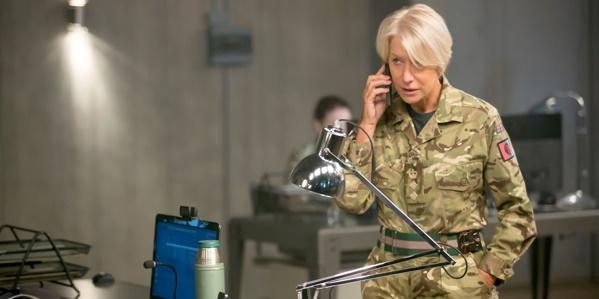Director: Gavin Hood
Starring: Helen Mirren, Alan Rickman, Barkhad Abdi, Aaron Paul
Certificate: 15
Running time: 102 mins
UK release date: 15 April 2016
For some years, drone warfare has been a subject of academic debate. Theorists have discussed questions of accountability, transparency, morality and the legality of extrajudicial killing in relation to this new and developing technology. However, the sphere of interest now extends well beyond academia: the entertainment industry is drawing increasing attention to drone warfare through series such as Homeland, and films such as London Has Fallen and now Eye in the Sky.
What exactly are we talking about when we refer to ‘drone warfare’? Drones are unmanned aerial vehicles that were first deployed in Kosovo for surveillance purposes but have since been developed to incorporate weapons. The drone optical systems allow their pilots, who can be thousands of miles away, to observe the reality on the ground with more accuracy than any other form of surveillance, and their guided missiles can isolate targets with a precision that was impossible only a few years ago. Drones are not seen or detected by the untrained eye, which makes a drone attack a silent, lethal surprise. In addition to weaponised drones, there also exist ‘bee drones’, small vehicles in the shape of a hummingbird or a beetle, into which are built sophisticated cameras which allow surveillance of places unreachable to human soldiers, and which give this film its title.
Eye in the Sky presents a joint military enterprise of UK, USA and Kenyan forces to capture a group of extremists who are planning a suicide attack in a safehouse in Nairobi. The group, of whom two members (the suicide bombers) are radicalised American and British citizens, is being watched by an American drone crew commanded by British Colonel Katherine Powell (Helen Mirren), and also by two bee drones piloted remotely by Farah, a Kenyan undercover field agent who is trying to capture images of the inside of the safehouse. Colonel Powell, facing the possibility of an imminent suicide attack, seeks an order from her superior, Lieutenant General Frank Benson (the late Alan Rickman), to change the mission objective from ‘capturing extremists’ to targeting the group with a drone strike.
[THE FOLLOWING PARAGRAPH CONTAINS SPOILERS]
So begins a series of intense conversations between American and British politicians and military personnel. While the latter argue that it is necessary to proceed to the strike, the politicians are concerned with the impact of collateral damage. The drama of collateral damage is played out through the arrival a young local girl, Alia (Aisha Takow), who is selling bread on the street very close to the safehouse, and would very likely be killed by the drone strike. Farah (a tremendous performance by Barkhad Abdi), tries to buy all of her bread but his cover is blown by local rebels and he is forced to flee. The drone pilots, when confronted with the order to proceed with the strike, ask for a re-evaluation of the collateral damage estimate. They have tears in their eyes when a second order is given to proceed and the girl dies. The drone pilots leave their air-conditioned trailers and return home.
The film lacks characterisation and does not accurately reflect the reality of warfare: for example, the presence of a young girl would not be considered a reason to suspend an attack on such high military targets; and some of the personal identification technology used in the film simply does not exist. Nevertheless Eye in the Sky does raise some important issues with which viewers can engage. First, that of the dissociation of risk: western powers carry out strikes thousands of miles away, with no physical risk to their own troops; and they engage the services of local agents who do not belong to the attacking armies. Such asymmetry in modern armed conflicts raises the question of whether we are lowering the threshold for the use of armed force. Second, several questions of accountability and transparency arise, not least from the fact that the strike is being carried out in a country that, as the film makes clear, is friendly to the USA and the UK. Is it legitimate to perform drone strikes in a country which is not involved in an armed conflict? Who exactly is being targeted? Does the ‘war on terror’ justify extrajudicial killing? Once members of terrorist groups are identified, should they be targeted even before any crime is committed? Finally, the film highlights the post-traumatic stress disorder that can afflict drone pilots as acutely as it can soldiers on the ground, as the experience of the American drone pilot Brandon Bryant shows. Drone pilots spend hours, days or even years in surveillance activities. They have access to an ‘augmented reality’, developing empathy for unnamed people whom they will one day receive the order to target. The pilots may be physically protected but they are mentally vulnerable.
Eye in the Sky raises, but does not answer these questions. It is a film to be watched not so much for what it is, but for what it encourages us to think about.






